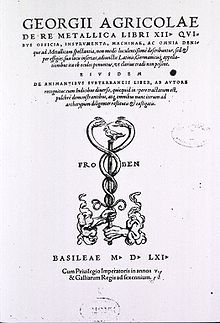De re Metallica

Title page of 1561 edition
|
|
| Author | Georgius Agricola |
|---|---|
| Translator |
Herbert Hoover Lou Henry Hoover |
|
Publication date
|
1556 |
|
Published in English
|
1912 |
| ISBN | |
| OCLC | 34181557 |
De re metallica (Latin for On the Nature of Metals (Minerals)) is a book cataloguing the state of the art of mining, refining, and smelting metals, published a year posthumously in 1556 due to a delay in preparing woodcuts for the text. The author was Georg Bauer, whose pen name was the Latinized Georgius Agricola. The book remained the authoritative text on mining for 180 years after its publication. It was also an important chemistry text for the period and is significant in the history of chemistry.
Mining was typically left to professionals, craftsmen and experts who were not eager to share their knowledge. Much experiential knowledge had been accumulated over the course of time. This knowledge was consecutively handed down orally within a small group of technicians and mining overseers. In the Middle Ages these people held the same leading role as the master builders of the great cathedrals, or perhaps also alchemists. It was a small, cosmopolitan elite within which existing knowledge was passed on and further developed but not shared with the outside world. Only a few writers from that time wrote anything about mining itself. Partly, that was because this knowledge was very difficult to access. Most writers also found it simply not worth the effort to write about it. Only in the Renaissance that perception began to change. With the improved transport and the invention of the printing press knowledge spread much easier and faster than before. In 1500 the publication of the first printed book dedicated to mining engineering, called the “Nutzlich Bergbuchleyn” (The Useful Little Mining Book”) by Ulrich Rulein von Calw. The most important work in this genre were, however, the twelve books De Re Metallica by Georgius Agricola, published in 1556.
Agricola had spent nine years in the Bohemian town of Joachimsthal, now in the Czech Republic. (Joachimsthal is famous for its silver mines and the origin of the word "Thaler" and, ultimately, "dollar.") After Joachimsthal, he spent the rest of his life in Chemnitz, a prominent mining town in Saxony. Both Joachimsthal and Chemnitz are in the Erzgebirge, or Ore Mountains.
...
Wikipedia
